Our ministry in El Salvador started in 1977 with the Child Sponsorship Program. In 2009, we implemented both the Child Survival and Leadership Development programs.
In July 2008, the ministry in El Salvador obtained facilities that will enable us to deliver new ministries and more effective services to our Implementing Church Partners.
Country Director
Guillermo Enmanuel Munoz Campos joined our ministry in El Salvador as a Partnership Facilitator Supervisor in 1998 and was promoted to Country Director in 2004. Prior to Compassion, Guillermo was a project planner for a company that worked with hydraulic networks and sewage systems. He was also an analyst for an organization that administered retirement funds.
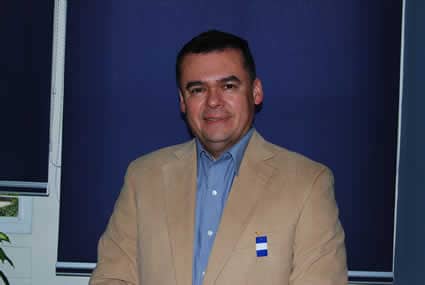
In 1979, Guillermo earned an associates degree in plastic engineering from the Technological Institute of San Salvador, and in 1986 he obtained a degree in industrial engineering from the Polytechnic University. He also holds a diploma in “Total Quality Applied to Education” from the Catholic University of Honduras.
Guillermo experienced poverty first-hand in the early years of his childhood. His father passed away when he was just 6 months old and once Guillermo grew old enough to help out, he had to work in the family business.
When he got a little older, Guillermo worked in a local movie theatre and on cotton plantations. The limitations and challenges he had faced as a young boy only strengthened his resolve to help others be released from poverty. He was taught to give his burdens to God and that poverty can be overcome.
When Guillermo meets with church leaders, children and youth, he is able to share from his own experience as he expresses his passion for the poor.
Implementing Church Partners
Implementing Church Partners are local churches in El Salvador with whom we work to deliver child development programs and ministry in the field.
- Spiritual Climate
Approximately 35 percent of our population is evangelical Christian and the church in El Salvador is growing. However, many Christians are migrating to other places because of crime. - Unique Challenges
One challenge in El Salvador is the high level of gang activity and crime in many of the urban areas where the Compassion-assisted child development centers are located. Also, there is a lack of community resources such as clean water, electricity, government assistance for education, and parks and playgrounds.Another challenge we face is high staff turnover at the child development centers. This is often because tutors at the centers look for better opportunities elsewhere.
- Contributions
Our Implementing Church Partners provide classrooms, electricity and, in some cases, clean water through a pipe system or wells. Parents often cook meals and prepare snacks for the children. - Church-to-Church
Twelve Implementing Church Partners have partnered with churches in the United States with whom they communicate via email. The churches are reporting that some of the benefits thus far are spiritual support, prayer and the ability to share experiences with each other. - Partner Development Activities
Our ministry in El Salvador develops partners through training on topics such as the program field manuals, curriculum and child advocacy.In addition, we have staff retreats, Christmas celebrations, an annual meeting for pastors, business fairs for Implementing Church Partners, project-cluster meetings, and the annual Willow Creek Global Leadership Summit for church leaders and pastors. We also provide resource books for Implementing Church Partner pastors and committee members.
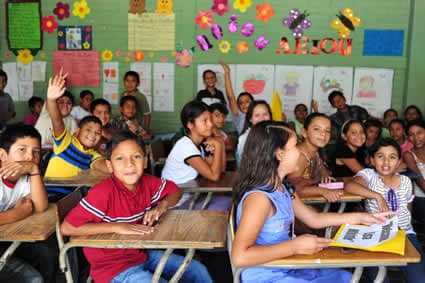
Child Survival Program
- Caregiver Literacy
Literacy lessons are given three times a month in the mothers’ homes. Some of the topics covered are math, identifying signs, and learning how to write their names. - Income-Generating Skills
Income-generating skills such as sewing, tailoring, baking and how to make pickled vegetables and jelly are offered once a week. - Health Care
Child Survival Program staff establish a relationship with the community health clinic to ensure that mothers get pre- and post-natal checkups on time. Mothers usually deliver their babies at these community health clinics as well.Some clinics will go to implementing church partners to give health screenings to mothers and children free of charge. If they do not provide health screenings, our ministry in El Salvador will pay for checkups given by a medical doctor as well as for medicine and lab tests if needed.
- Nutritional Support
Once a month, each caregiver receives a food basket with nutritional supplies such as Incaparina, a low-cost protein food made of cottonseed, corn and sorghum flours that is used to prevent protein deficiencies.Malnourished children receive food that is even higher in protein and fat. We also provide education on nutrition as well as workshops on how to make nutritious food for children.
- Involvement of Fathers
Child Survival Program implementers make an effort to invite the fathers to all activities in which their children and wives/partners participate, including workshops, early stimulation sessions and home visits.In addition, every month fathers are invited to Parents’ School where implementers tell them about all the activities their children and wives/partners are engaged in and where they can learn about various topics.
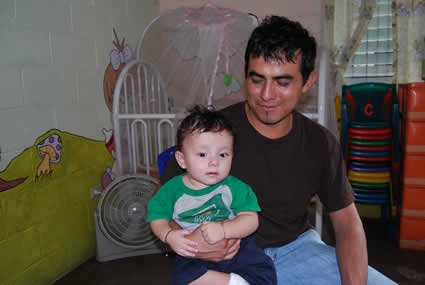
The Child Survival Program is a year old. In our first year, 10 couples who had been living together are now married and the program has sponsored a couples retreat.
- Transition Out of the Child Survival Program
Children who are 2 1/2 years old or older will begin to participate in some of the Child Sponsorship Program activities for 3 to 5 year olds. Their parents can continue to attend Parents’ School and some mothers help with snack preparation for children in the Child Sponsorship Program. - Areas of Expansion for the Child Survival Program
We plan to expand into the central and east areas of El Salvador. These areas have a high level of health problems, limited access to community health centers, and lack clean water, hygiene, early education and job opportunities.There are also high incidences of teenage pregnancy and many single mothers.
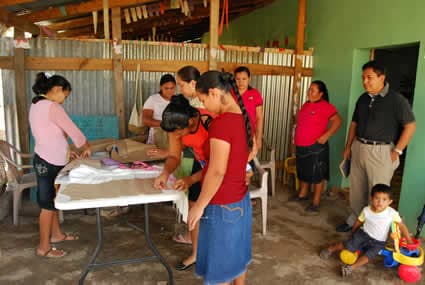
Child Development Through Sponsorship
Your sponsorship of a child in El Salvador provides a variety of benefits.
In El Salvador, 1st- to 9th-grade children go to school five hours per day, either in the morning or the afternoon. High school students attend school 6 to 9 hours per day. Because of this, the younger children are able to come to the child development centers more frequently than the older children:
- Meeting Times
- 3 to 5 year olds: 3 hours a day, 3 days a week
- 6 to 8 year olds: 3 hours a day, 3 days a week
- 9 to 11 year olds: 3 hours a day, 3 days a week
- 12 to 14 year olds: 2 hours a day, 2 days a week
- 15 to 18 year olds: 4 hours a day, 1 day a week
- Nutritional Support
Each child receives a nutritious meal every time he or she goes to the child development center. A typical meal consists of a carbohydrate such as bread or tortillas, and protein such as soy, meat or chicken.This can include sandwiches, soup, rice pudding, pupusas (tortilla filled with cheese and beans), or enchiladas (tortillas with fried beans, tomato, hard-boiled eggs and cheese).
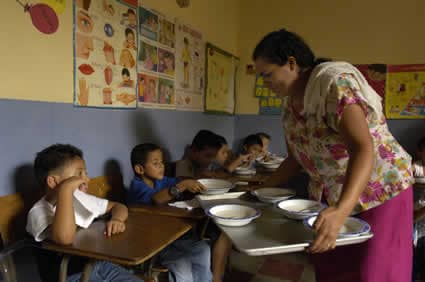
Since the food crisis in 2007, our child development centers have switched from serving snacks to full meals. Centers provide these meals because not all of the children receive a meal at school.
For those who are underweight and/or malnourished, additional nutritional supplements rich in vitamins and protein are provided.
- Vaccinations
Vaccinations are mandatory in El Salvador and are provided at public clinics at no charge. - Extracurricular Activities or Community Service
We offer extracurricular activities such as camps, drama, football, painting and museum visits. Community service opportunities include cleanup campaigns, reforestation activities and childcare. - Vocational Activities
Adolescents need to learn an income-generating skill that is practical, easy to learn and will earn money quickly.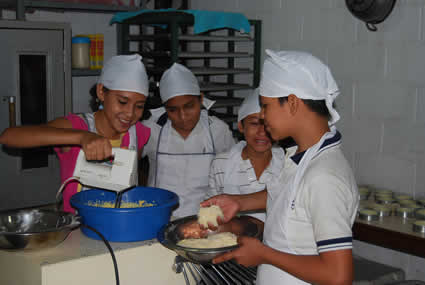
That is why vocational activities such as computer training, tailoring, dress making, beauty, baking, poultry production, fish farming, silk screening, rabbit farming, and bean, corn and vegetable farming are all available for our students. They also receive spiritual teaching and, in some centers, they learn English.
- Job Placement for Adolescents
Some Child Sponsorship Program graduates return to their child development centers to work as tutors, accountants, or in other roles. - Parent Involvement
We have Parents’ School once a month in which parents can learn about a variety of topics. Parents are also welcome to attend camps and workshop activities at the child development centers. They help regularly with food preparation for the children as well. - Areas of Expansion for the Child Sponsorship Program
We would like to expand in the northern and eastern regions of El Salvador because these are poorer areas that have very few child development centers.
Leadership Development Program
- Universities Attended
LDP students attend private universities. - Location of Universities
Universities are located primarily in the capital city of San Salvador. - Working Students
Students work part-time or full-time while attending university. Because of this, it takes them longer to graduate. If a Leadership Development Program student studies full-time, he or she can graduate in six years. In El Salvador it takes approximately five years to earn a degree and then an additional year is spent on a thesis. - Service Opportunities
Leadership Development Program students can disciple others at their church, tutor children at their child development center, or participate in cleanup campaigns and reforestation activities in their communities. - Leadership Development Program Meetings
The larger Leadership Development Program group meets every two months to carry out curriculum activities. - Specialty Curriculum
We cover topics such as dating, courtship and marriage, the biblical view of sexuality, time management, study techniques and Bible study. - Mentors
We ask ministry staff in El Salvador to become mentors, so at least 60 percent of the Leadership Development Program students have a mentor.
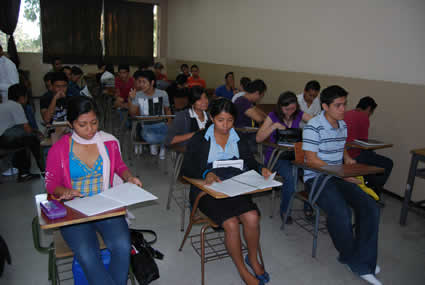
Complementary Interventions
Our core Child Sponsorship Program, while comprehensive, does not address all obstacles to a child’s healthy development. Compassion’s Complementary Interventions program was created to work with our holistic child development model to provide additional services, such as our AIDS Initiative, Bibles for all children, disaster relief and safe-water projects.
Here are some of the Complementary Interventions we offer in El Salvador:
- Disaster/Crisis
Response to hurricanes, earthquakes, floods, etc. - Health and Nutrition
Supplemental nutrition for malnourished children, HIV education, food for children during the food crisis - Infrastructure
Water tanks, latrines, computers, bakery - Education
National certified curriculum and Bible for all child development centers - Other
Entrepreneurial funds for children and parents, soccer school for adolescents
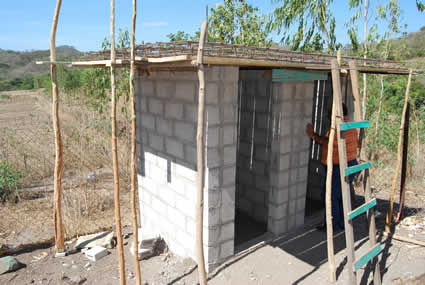





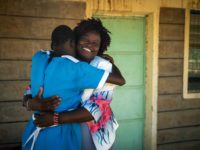
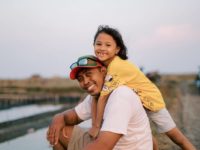



14 Comments |Add a comment
Where do I direct a needed family from a broken home to get help in San Miguel, El Salvador?
Hi Juan,
Please have them email us directly at [email protected] and we can see if we can assist them! Thank you so much!
We just sponsored a child from El Salvador and was wondering if anyone took a trip to the center in El Salvador? My husband and I would love to visit the center some time and to meet our sponsor child.
Hi Rebecca —
We visited our child in June, 2010, about a year after we had been sponsoring her. It was a fantastically powerful visit for us and for her, and a terrific “insider’s look” at Compassion’s work in the field. We were part of a group tour sponsored by Compassion. It lasted for 4 days and we visited the national office in San Salvador, then went to several different projects in the countryside, and then spent a day with our child … and it was all fabulous, especially the time with our child.
Compassion has group tours to El Salvador at least once per year; the next one is in late October and then there is another one scheduled for next October. You can get the information from the Compassion website, or give them a call. If you want to see what a tour is like, there are several videos on YouTube (in the search box type in El Salvador Compassion Trip).
You can also visit your child directly without a tour; this you would arrange by contacting Compassion’s office.
My sponsored child is from El Salvador and lives in an area where there is a large gang presence. I can only imagine what her life would be like if Compassion wasn’t there. Thanks for a great article on the details of Compassion’s program in El Salvador!
Awesome! (:
Thank you so much, this is a really helpful and informative report. I will be sending this post on to those in my church who sponsor from El Salvador. Keep up the good work.
My husband and I sponsor two children in El Salvador. Thank you for sharing about the good work Compassion is doing there.
This is a great explanation of how Compassion’s ministry works. Thanks so much for the details and thorough article. I will share this with others for sure.
This reminded me to pray about the gang activity in the urban areas. I am encouraged to hear the % of evangelical Christians
in El Salvador. May God bless El Salvador and the United States
with his Holy Spirit to turn our hearts to Jesus.
A wonderfully detailed article; thank you so much for sharing … and thanks for all that you are doing in El Salvador. When we took a group tour to visit our child there, it was evident right from the start how well-organized and well-run Compassion is in that country, and what a fabulous job the local churches are doing as well. This article just adds more details about the breadth of the work that is going on. In our group tour we were blown away by the powerful testimony of the LDP students. And I’ve also been impressed by the wonderful growth and maturing of the child that we sponsor — her growth spiritually, intellectually and socially. I know that this is the Lord’s work, and the result of many prayers, and the result of the labors of the Compassion staff and it’s church partners in El Salvador. Gracias a Dios! And thanks to the Compassion staff, too.
We’d like to visit the center some time to meet our sponsor child – how did you plan the trip?
One of my sponsored children is from El Salvador. I appreciate the comprehensive information; it’s shown me some additional ways I can pray for Jose and his family.
Mine is too! What project is yours from.. mine is from Gamaliel Student Center(: